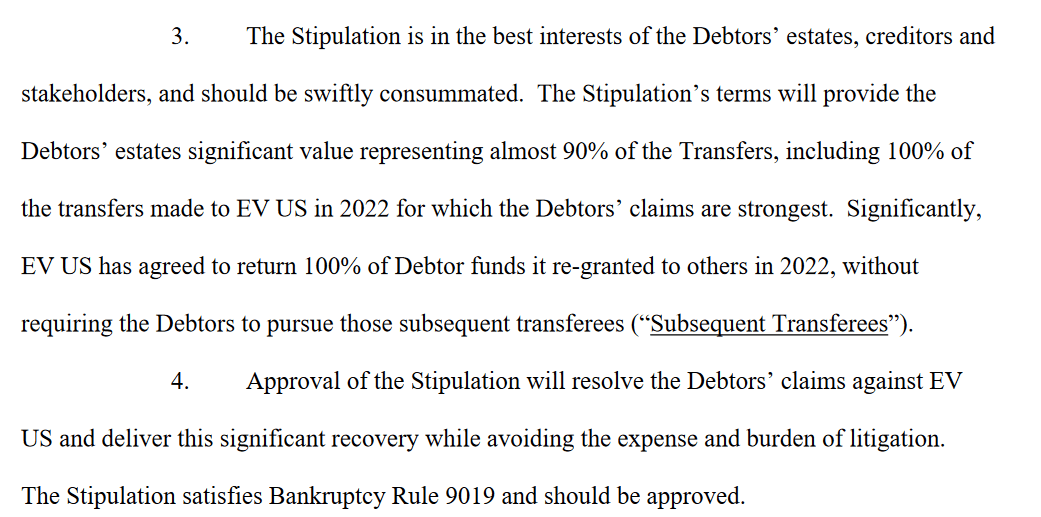We’re announcing two updates today that we believe will strengthen the effective altruism ecosystem.
FTX updates
First, we’re pleased to say that both Effective Ventures UK and Effective Ventures US have agreed to settlements with the FTX bankruptcy estate. As part of these settlements, EV US and EV UK (which I’ll collectively refer to as “EV”) have between them paid the estate $26,786,503, an amount equal to 100% of the funds the entities received from FTX and the FTX Foundation (which I’ll collectively refer to as “FTX”) in 2022. All of this money was either originally received from FTX or allocated to pay the settlement with the knowledge and support of their original donor. This means that EV’s projects can continue to fundraise with confidence that donations won’t be used to cover the cost of this settlement. We strongly condemn fraud and the actions underlying Sam Bankman-Fried’s conviction.
Also related to FTX, in September we completed an independent investigation about the relationship between FTX and EV. The investigation, commissioned from the law firm Mintz, included dozens of interviews as well as reviews of tens of thousands of messages and documents. Mintz found no evidence that anyone at EV (including employees, leaders of EV-sponsored projects, and trustees) was aware of the criminal fraud of which Sam Bankman-Fried has now been convicted.
While we are not publishing any additional details regarding the investigation because doing so could reveal information from people who have not consented to their confidences being publicized and could waive important legal privileges that we do not intend to waive, we recognize that knowledge of criminal activity isn’t the only concern. I plan to share other non-privileged information on lessons learned in the aftermath of FTX and encourage others to share their reflections as well.
EV also started working on structural improvements shortly after FTX’s collapse and continued to do so alongside the investigation. Over the past year, we have implemented structural governance and oversight improvements, including restructuring the way the two EV charities work together, updating and improving key corporate policies and procedures at both charities, increasing the rigor of donor due diligence, and staffing up the in-house legal departments. Nevertheless, good governance and oversight is not a goal that can ever be definitively ‘completed’, and we’ll continue to iterate and improve. We plan to open source those improvements where feasible so the whole EA ecosystem can learn from EV’s challenges and benefit from the work we’ve done.
We’re pleased to have reached this point and to bring our financial interactions with the FTX bankruptcy to a close. We expect the settlements will permanently resolve matters between EV US + EV UK and the FTX estate, enabling EV, our teams, and our projects to move forward.
Future of EV
Which brings me to our second announcement: Now that we consider matters with the FTX estate to be resolved, we are planning to take significant steps to decentralize the effective altruism ecosystem by offboarding the projects which currently sit under the Effective Ventures umbrella. This means CEA, 80,000 Hours, Giving What We Can and other EV-sponsored projects will transition to being independent legal entities, with their own leadership, operational staff, and governance structures. We anticipate the details of the offboarding process will vary by project, and we expect the overall process to take some time – likely 1-2 years until all projects have finished.
EV served an important purpose in allowing these projects to launch with lower friction, but the events of last year also made the costs of centralization and EV’s structure much more salient. Many of our projects are now well established and will benefit from independent structures designed with their specific needs in mind, though I also suspect that there will be some friction as they establish their new operating models. Despite the potential costs, we are convinced this push towards decentralization will make the EA ecosystem more resilient and better enable our projects to pursue their own goals. We’ve learned a lot through the mistakes and success that occurred while building EV and we plan to share additional reflections when they are ready.


Quick flag that this is mixed evidence for "EA organizations should be very small".
First, this focuses on gigantic organizations. Alphabet has around 190k employees now, ~60k in 2015 when it "split". https://www.macrotrends.net/stocks/charts/GOOG/alphabet/number-of-employees. I believe we have more information about mergers and acquisitions than we do companies splitting up, and there I think things seem more favorable. (My impression is that companies often do more M&A than investors would want, but there are definitely some cases where it's a good fit for both executives and investors.)
Second, I believe one big reason why the stock market prefers large companies be split up is because that way they could invest less in the parts that funders don't like. In the case of Alphabet, I believe the executives were spending a lot of money on non-search products that investors would have rather been shut down. I'm not sure how much this applies to the nonprofit case, at least in worlds where funders have a lot of control.